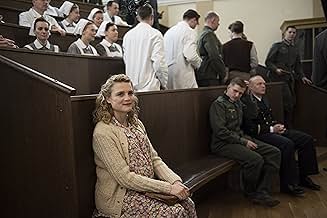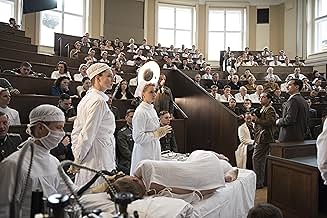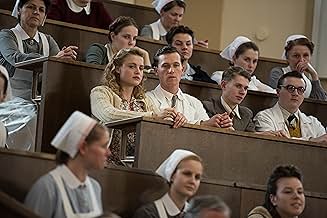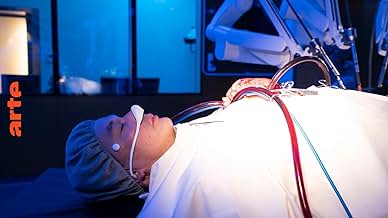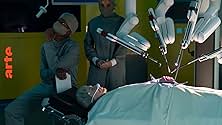Les exploits des plus célèbres médecins et scientifiques allemands du prestigieux hôpital de la Charité à Berlin au cour de son histoire.Les exploits des plus célèbres médecins et scientifiques allemands du prestigieux hôpital de la Charité à Berlin au cour de son histoire.Les exploits des plus célèbres médecins et scientifiques allemands du prestigieux hôpital de la Charité à Berlin au cour de son histoire.
- Récompenses
- 3 victoires et 9 nominations au total
Parcourir les épisodes
Avis à la une
Overall, good television. There are a few points that an American audience may find cloying, but I had no problem with it. It may be too "soapy" with the romantic entanglements woven into the story. I could have done without the melodrama-- less of it anyway-- but it has to be taken into consideration this is a "continental European" drama. In many ways, this can be attributed to the timeframe of the story. Late nineteenth century European society was more heavily church dominated in that era. So, what seems like quaint, outdated and even eyerolling concerns that weigh so heavily in this story can come off as silly, in that period these were issues that strongly impacted daily life. While these subplots may seem overly dusty to most viewers, it certainly is historically appropriate. There is also the fact that this was produced with a German audience first and foremost. As I've seen in other recent German productions (Babylon Berlin; Our Fathers, Our Mothers --aka "Generation War" outside of Germany) , the romantic subplots aren't presented in quite the same fashion as they are on this side of the Atlantic. As for myself, I find it a refreshing shift in presentation.
Production, writing and performance are all high standard. Well above what is typical German television. While it might not grab a huge audience in the U.S. because of its subtle but still distinctly different style in telling a story, I strongly encourage folks to give it a try.
Production, writing and performance are all high standard. Well above what is typical German television. While it might not grab a huge audience in the U.S. because of its subtle but still distinctly different style in telling a story, I strongly encourage folks to give it a try.
8B24
On first viewing the promos for this series, I was determined not to watch it, fearing that...like so many German films in recent past...it would be filled with sensationalist and graphic wartime atrocities. When at the urging of a colleague I did give it a chance, I was pleasantly rewarded by its technical brilliance and occasional emotional depth. The medical scenes are nowhere as good as those of British or American hospital soaps, but they are in any case subordinate to a riveting drama framed by actual historical data from World War 2. The main characters are in fact based on real people, and the events more or less accurately in harmony with contemporary events.
As usual, subtitles are inferior to dubbing. Simultaneous verbal and visual effects are needed to avoid losing a great deal of dramatic impact. Many subtle or ironic phrases in German go flying right past translation, especially in a rapid fire interchange like many in this story.
Another minor fault is that, as in many fictional accounts of the war, too many small gratuitous references and characters from history keep popping up to impede the main narrative. But that in no way diminishes the central theme of ordinary people, non-combatants, coping with the traumatic impact of atrocities occurring all around them.
Are there other lessons to be learned from witnessing a sympathetic and righteous population taken over by a cult leader in challenging times? I think so.
Moving, thoughtful and thought provoking. While these events were unfolding in Berlin I was in London and, briefly, a patient in the blacked out and lightly blitzed Children's Hospital, Great Ormand St. Only people of my advanced age , British as well as German, will fully understand what they are seeing. However all the youngsters can enjoy the intelligent script and fine acting.
But the task is well executed. While there is some telescoping of historical events, I have a degree in history and the story line I found to be artistically effective. Acting, pacing and production values exceed expectations. And to disagree with one reviewer, the Russians were barbaric in their ending of the war. If anything, that was downplayed.
I watched the original Charite', which was focused on the "competition" between Drs. Robert Koch and his developing treatment for tuberculosis, and Emil Behring, who discovers an effective cure for diphtheria. Both series are well produced and written, and capture the "zeitgeist" of both eras represented in this series. Both series set high standards for both production and performance, but I have to give the nod to this latest installment. It backs off the melodrama a bit more than its predecessor, and gives-- what I believe-- a more clear-eyed perspective of the political times and the trials and tribulations of the German people in WW2. It scores extra points in that this perspective is viewed through the eyes of non-combatants and non-political figures in Nazi Germany. This series and "Babylon Berlin" (really waiting for the next installment of this gem) are huge leaps forward for German television, threatening to not only becoming a peer of the BBC and other British programming, but shows signs the Germans are ready to assume the role of being the class of European exporter of "small screen" production. Good stuff.
Le saviez-vous
- AnecdotesSeason 3 takes place in Berlin, summer 1961.
- ConnexionsReferenced in Riverboat - Die MDR-Talkshow aus Leipzig: Folge vom 15. Februar 2019 (2019)
Meilleurs choix
Connectez-vous pour évaluer et suivre la liste de favoris afin de recevoir des recommandations personnalisées
- How many seasons does Charité have?Alimenté par Alexa
Détails
Contribuer à cette page
Suggérer une modification ou ajouter du contenu manquant


![Regarder Trailer Staffel 2 [OV]](https://m.media-amazon.com/images/M/MV5BNWU0YWE0YjMtNDZjYy00ODk3LWE1NWItMjkwOTE0NTA5MDA4XkEyXkFqcGdeQXRyYW5zY29kZS13b3JrZmxvdw@@._V1_QL75_UX500_CR0)
